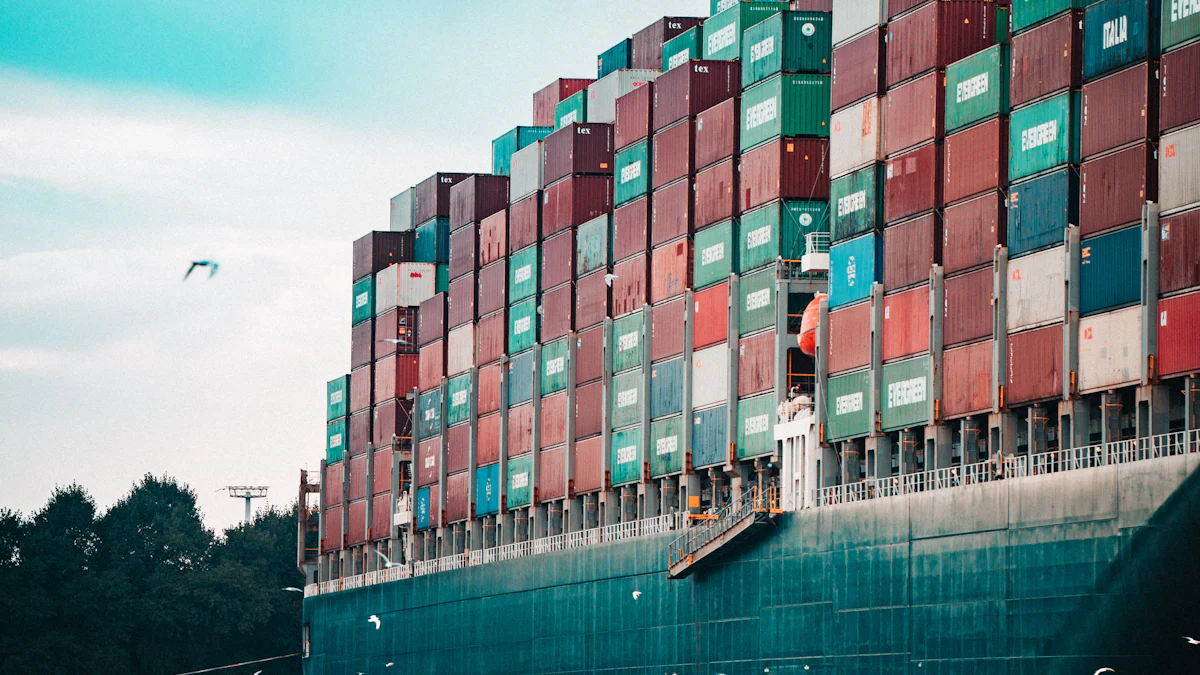The Ultimate Guide to Sustainable Transportation in Supply Chains

Sustainable Transportation in Supply Chains involves the integration of eco-friendly methods to address environmental, economic, and social challenges. Embracing sustainable practices is crucial for reducing carbon emissions and promoting resource conservation. Throughout this blog, readers will explore the significance of sustainable transportation, strategies for implementation, and cutting-edge technologies driving positive change in supply chain logistics.
Importance of Sustainable Transportation

In the realm of supply chains, embracing Sustainable Transportation in Supply Chains is paramount for businesses looking to reduce their environmental impact and enhance operational efficiency. By focusing on sustainable transportation practices, companies can significantly contribute to the reduction of carbon emissions and the conservation of valuable resources.
Environmental Benefits
Reduction of Carbon Footprint
Transitioning to sustainable transportation methods plays a crucial role in reducing carbon emissions. For instance, companies like IKEA have successfully implemented intermodal transport solutions, leading to a notable decrease in relative emissions and a commitment to eliminating dependency on fossil fuels. This shift towards eco-friendly transport not only benefits the environment but also showcases a dedication to sustainability.
Conservation of Resources
Incorporating sustainable transportation practices also aids in the conservation of essential resources. Businesses that utilize data-driven algorithms for urban logistics optimization witness an increase in delivery effectiveness while simultaneously reducing traffic congestion and pollution. Moreover, the transition to electric trucks for logistics purposes has shown promising results by significantly decreasing carbon emissions. These initiatives highlight the importance of resource conservation within supply chain operations.
Economic Benefits
Cost Savings
Implementing sustainable transportation strategies can lead to substantial cost savings for organizations. By optimizing routes and leveraging green logistics solutions, companies can streamline their operations and minimize unnecessary expenses. For example, businesses that replace existing vehicles with new ones powered by biofuels ensure that their transportation remains '100% green,' resulting in long-term financial benefits.
Compliance with Regulations
Adhering to environmental regulations is a critical aspect of sustainable transportation management. Sustainable logistics practices not only help businesses meet regulatory requirements but also prevent fines and penalties associated with non-compliance. Understanding regulations and implementing best practices ensure that companies operate within legal frameworks while promoting environmentally responsible transport methods.
By prioritizing sustainable transportation practices, businesses can achieve a harmonious balance between environmental stewardship and operational excellence within their supply chains.
Strategies for Implementation
Green Logistics
Route Optimization
To enhance operational efficiency and reduce fuel consumption, organizations can implement route optimization strategies. By leveraging advanced data analytics, companies can identify the most efficient routes that minimize travel time and fuel usage. This not only reduces carbon emissions but also lowers transportation costs significantly. Integrating renewable energy sources such as solar-powered vehicles into the logistics fleet further enhances the sustainability of transportation operations.
Load Optimization
Load optimization is a critical aspect of sustainable transportation practices. By maximizing the capacity of each shipment, businesses can reduce the number of trips required, leading to lower fuel consumption and emissions. Unilever's commitment to load optimization has resulted in a substantial decrease in their carbon footprint while improving overall supply chain efficiency. Additionally, Patagonia's focus on using recycled packaging materials ensures that shipments are both environmentally friendly and cost-effective.
Sustainable Practices
Use of Eco-friendly Vehicles
Embracing eco-friendly vehicles is a key strategy for promoting sustainable transportation within supply chains. Organizations like Unilever have integrated electric vehicles into their fleets, significantly reducing greenhouse gas emissions associated with traditional gasoline-powered trucks. This shift towards electric vehicles not only aligns with environmental goals but also showcases a commitment to innovation and sustainability in logistics operations.
Efficient Warehousing
Efficient warehousing plays a crucial role in sustainable logistics management. By optimizing warehouse layouts and implementing smart inventory management systems, businesses can streamline their operations and reduce unnecessary resource consumption. Companies like Amazon have set a precedent by utilizing automation technologies in warehouses to improve efficiency and minimize waste generation. These sustainable warehousing practices contribute to overall supply chain sustainability by minimizing environmental impact and enhancing operational performance.
Policy and Regulation Compliance
Understanding Regulations
Compliance with environmental regulations is essential for sustainable transportation practices. Organizations must stay informed about evolving regulations related to emissions standards, vehicle electrification, and sustainable fuel usage. By understanding these regulations, businesses can proactively adjust their transportation strategies to align with legal requirements while contributing to global sustainability initiatives.
Implementing Best Practices
Implementing best practices in policy compliance is crucial for ensuring long-term sustainability within supply chains. Companies that prioritize transparency in reporting emissions data and invest in employee training on sustainable transport methods demonstrate a commitment to responsible business practices. Through cross-industry collaboration and knowledge sharing, organizations can collectively drive positive change towards greener supply chain operations.
Technologies and Innovations

Renewable Energy Sources
Solar-powered Vehicles
In the realm of sustainable transportation, solar-powered vehicles are revolutionizing the way companies approach eco-friendly logistics. By harnessing the power of the sun, these vehicles offer a clean and renewable energy source that reduces dependency on traditional fossil fuels. Companies like Tesla have pioneered the integration of solar technology into their electric vehicles, enhancing efficiency and promoting environmental sustainability.
Wind Energy Integration
Integrating wind energy into transportation systems presents a promising avenue for reducing carbon emissions and promoting sustainability. Wind-powered vehicles utilize innovative technologies to convert wind energy into usable power, offering a renewable alternative to conventional fuel sources. Organizations investing in wind energy integration demonstrate a commitment to green practices and contribute to a cleaner environment for future generations.
Advanced Data Analytics
Predictive Analytics
Predictive analytics plays a pivotal role in optimizing supply chain operations and enhancing transportation efficiency. By leveraging predictive modeling techniques, companies can forecast demand patterns, optimize delivery routes, and minimize operational costs. This data-driven approach enables organizations to make informed decisions that streamline logistics processes and reduce environmental impact through resource optimization.
Real-time Monitoring
Real-time monitoring solutions empower businesses to track vehicle performance, monitor fuel consumption, and ensure compliance with sustainability standards. Through the integration of IoT devices and advanced sensors, real-time monitoring systems provide valuable insights into fleet operations in a dynamic environment. Companies utilizing real-time monitoring capabilities can proactively address issues, improve route efficiency, and promote eco-friendly practices within their transportation networks.
Automation and AI
Autonomous Vehicles
The advent of autonomous vehicles represents a significant leap forward in sustainable transportation innovation. These self-driving vehicles leverage artificial intelligence algorithms to navigate roads efficiently, reduce traffic congestion, and enhance overall safety. Companies investing in autonomous vehicle technology are not only improving operational efficiency but also contributing to a greener future by minimizing emissions associated with traditional transport methods.
AI-driven Optimization
AI-driven optimization tools are transforming supply chain management by streamlining processes and maximizing resource utilization. Artificial intelligence algorithms analyze vast amounts of data to identify inefficiencies, optimize delivery schedules, and reduce carbon footprint. Organizations embracing AI-driven optimization witness improvements in cost-effectiveness, operational agility, and environmental sustainability as they pave the way for smarter logistics practices in the digital age.
Sustainable transportation plays a pivotal role in promoting efficiency and optimization within supply chains. By embracing eco-friendly methods, businesses can reduce pollution, lower costs, and improve public health. The transition to sustainable practices not only lessens the sector's ecological footprint but also contributes to a cleaner, healthier environment. Advanced route planning tools incorporating real-time data ensure drivers take the most fuel-efficient routes, further enhancing sustainability efforts. Sustainable transport is essential for curbing climate change and fostering eco-friendly urban development, ensuring a better future for all stakeholders involved.
See Also
Sustainability Strategies for Managing Supply Chain Risks
Unveiling Robotics Tech Trends for Sustainable Supply Chains
Revealing Top Global Logistics Companies Guide
The Importance of Implementing Sustainable Supply Chains
Navigating Effective Strategies for Supply Chain Risk Mitigation
